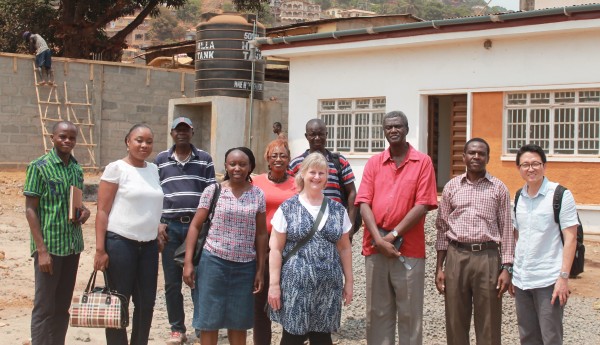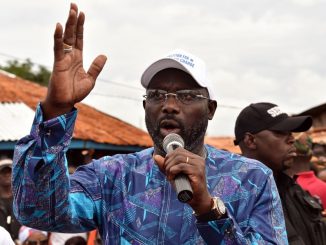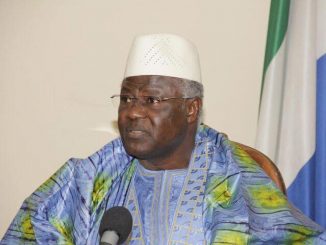
By: Amadu Femoh Sesay
Communications Officer-IPCB
Group Photo: Ms. Appelblom (Forefront) and Mr. Collier (3rd from right) at the New England office. (Photo: UNDP)
The United Nations Chief of the Standing Police Capacity, Maria Appelblom from Italy accompanied by Annette Nalwoga, Team Leader, Governance Cluster, Mary Turay, Project Coordinator, Security and Livelihood and other Staff of the United Nations Development Programme (UNDP) based in Sierra Leone on Saturday 9th April, 2016 paid a Courtesy Call on the Chairman and Staff of the Independent Police Complaints Board (IPCB) at the IPCB Headquarters at 167 Circular Road, Freetown.
Welcoming the delegation, the Chairman of the IPCB, Valentine T. Collier thanked the UNDP for being supportive since the establishment of the Board.
Mr. Collier said the UNDP Security Sector Reform Project has supported the establishment of the Board through a serious of focused interventions aimed at ensuring that the institution was empowered operationally to perform its functions.
He recalled that as part of its focused support, the UNDP has provided the IPCB with office equipment, furniture, a vehicle and is also funding the rehabilitation of the IPCB’s permanent Headquarters allocated by the Government of Sierra Leone at New England Ville, Freetown.
The Chairman informed the team that an independent civilian oversight mechanism for the police was a new culture in Sierra Leone and there was need for the IPCB to embark on awareness and sensitization campaigns to educate the public.
Mr. Collier disclosed that the IPCB was presently on a nationwide Focus Group Engagement (FGE) and the aim was to sensitize and raise awareness regarding the functions and role of the IPCB. He pointed out that these set of activities at District level, form the third stage in the IPCB’s public outreach following the Formal Launch on 20th October, 2015 and the Regional Launches and Town Hall Meetings in Makeni, Bo and Kenema Cities in November last year.
The Chairman said the IPCB in giving effect to its mandate sees itself as first and foremost, a ‘people-centred and listening organization’ since a main component of its activities rely on receiving complaints from citizens throughout the country. Mr. Collier emphasized that the institution also sees itself as a ‘bridge-builder’ working towards bringing the police and the community closer.
He informed the delegation that the Board had developed a Five-Year Strategic Plan (2016-2020) and a Website, saying that both will be launched during the formal opening of the IPCB New England Headquarters slated for May, 2016.
Talking on the challenges affecting the operations of the Board, the Chairman said the institution was seriously under staffed and in urgent need of additional officers to help roll-out the Strategic Plan.
“At the moment we have just six professional staff including myself. We find it frustrating that a ban on recruitment has been in force since June, 2014 is still being enforced against the IPCB” he said.
The United Nations Chief of the Standing Police Capacity stated that the establishment of the Board was a laudable initiative, adding that she was impressed with work done so far by the IPCB.
“We have seen the result of your work” she re-affirmed.
Ms. Appelblom also noted that it was very interesting to hear about the IPCB and its future plans despite the current challenges highlighted by the Chairman.
She said it was important that the IPCB is available for the population, citing out regular communications as one of the means to get in touch with communities throughout the country.
Ms. Appelblom pointed out that the Standing Police Capacity would assist the IPCB in capacity building.
The UN’s Standing Police Capacity is the rapidly deployable arm of the Police Division with an approved operational capacity of 40 staff members and a unique blend of leadership and specialized knowledge. It assists in the fulfillment of the strategic mission of the UN Police, which is to build institutional police capacity in post conflict environments.
The meeting ended with a conducted tour of the UNDP funded IPCB’s new Headquarters at New England, Freetown.



